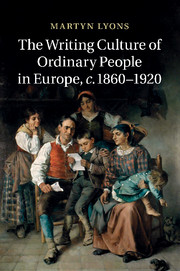Book contents
- Frontmatter
- Contents
- Illustrations
- Maps
- Acknowledgements
- Note on translations and transcriptions
- 1 Ordinary writings, extraordinary authors
- 2 Archives for an alternative history
- 3 ‘Excuse my bad writing’
- 4 Literary temptations
- 5 France
- 6 France
- 7 Family, village and motherland in the writing of Italian soldiers, 1915–1918
- 8 Italian identities ‘from below’ and ordinary writings from the Trentino
- 9 Love, death and writing on the Italian front, 1915–1918
- 10 Spain
- 11 Family strategy and individual identities in the letters of Spanish emigrants
- 12 Order and disorder in the ‘memory books’
- 13 Conclusions
- Bibliography
- Index
- References
11 - Family strategy and individual identities in the letters of Spanish emigrants
Published online by Cambridge University Press: 05 November 2012
- Frontmatter
- Contents
- Illustrations
- Maps
- Acknowledgements
- Note on translations and transcriptions
- 1 Ordinary writings, extraordinary authors
- 2 Archives for an alternative history
- 3 ‘Excuse my bad writing’
- 4 Literary temptations
- 5 France
- 6 France
- 7 Family, village and motherland in the writing of Italian soldiers, 1915–1918
- 8 Italian identities ‘from below’ and ordinary writings from the Trentino
- 9 Love, death and writing on the Italian front, 1915–1918
- 10 Spain
- 11 Family strategy and individual identities in the letters of Spanish emigrants
- 12 Order and disorder in the ‘memory books’
- 13 Conclusions
- Bibliography
- Index
- References
Summary
The self and the family
Emigrants’ letters performed a collective ritual. Their elaborate theatre of formal greeting and farewell re-located the absent author within the social group which had given his life a context and a meaning. At the same time, correspondence to and from emigrants had another important function: it served to manage family affairs and to realise a family strategy. Emigration was a family resource, a way of fulfilling the ambitions of young offspring while maintaining the family’s rural property intact. The emigrant’s personal ambitions served the family interest. The emigrant had strong incentives to succeed: he was driven by family expectations and by his own masculine pride. The fear of failure, and the stigma of shame it carried, haunted him. As a result, the news he relayed home was often carefully filtered to avoid giving any impression of failure. The remittance of money home at regular intervals was a duty and an expression of the family strategy which lay at the origin of the emigrant’s displacement. The importance of paternal authority in determining such family strategies remained paramount. The transnational world of the migrant was still a patriarchal world.
In David Gerber’s analysis of British emigrant letters, correspondence plays a crucial role in forming the author’s individual personality, and in defining his or her evolving self. The Asturian case, however, suggests that Gerber’s argument should be nuanced to recognise the powerful family constraints which circumscribed the individual correspondent. The self was frequently sacrificed to the interests of the family, and letters perpetuated individual submission to an overriding purpose. Sometimes, of course, the individual found himself in conflict with parents. His letters expressed frustration and a desire for greater independence. He might even decide to marry, a decision which traditionally required parental approval, although the family’s strategy was often better suited by delaying marriage. Writing letters, then, expressed a changing individual identity; there is nothing quite as personal as their handwriting and the very individual signatures which closed them. The individual, however, developed a personal identity within the framework of the family that had sent him or her to the Americas.
- Type
- Chapter
- Information
- The Writing Culture of Ordinary People in Europe, c.1860–1920 , pp. 201 - 221Publisher: Cambridge University PressPrint publication year: 2012



